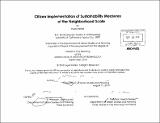Citizen implementation of sustainability measures at the neighborhood scale
Author(s)
Heilke, Ingrid (Ingrid Elizabeth)
DownloadFull printable version (21.14Mb)
Other Contributors
Massachusetts Institute of Technology. Dept. of Urban Studies and Planning.
Advisor
Joseph Ferreira.
Terms of use
Metadata
Show full item recordAbstract
There is the potential for citizens to make a profound impact on the sustainability of cities at the neighborhood scale. This is the scale that people relate to spatially, economically, and socially. It is also a scale that tends to be left out in sustainability planning as governments focus on the level of cities or regions, and individuals focus on their own households. Yet, some sustainability measures require coordination at the neighborhood scale. This paper is an investigation of eighteen entities that have attempted to enhance urban sustainability at the neighborhood scale either by direct implementation, by coordinating or training groups to implement measures themselves, or by developing tools to aid implementation. I discuss the successes of these endeavors, as well as the constraints and barriers that they have faced. The ultimate goal of this paper is to identify the most effective and appropriate routes for citizen implementation and to highlight how these routes can best be supported. To this end, I propose the development of a Green Blocks Toolkit, containing a suite of organizational tools, a database to track metrics and examples, and a strategy for interfacing with institutional support that can help groups overcome barriers and aid in their success and duplication.
Description
Thesis (M.C.P.)--Massachusetts Institute of Technology, Dept. of Urban Studies and Planning, 2010. Cataloged from PDF version of thesis. Includes bibliographical references (p. 97-102).
Date issued
2010Department
Massachusetts Institute of Technology. Department of Urban Studies and PlanningPublisher
Massachusetts Institute of Technology
Keywords
Urban Studies and Planning.